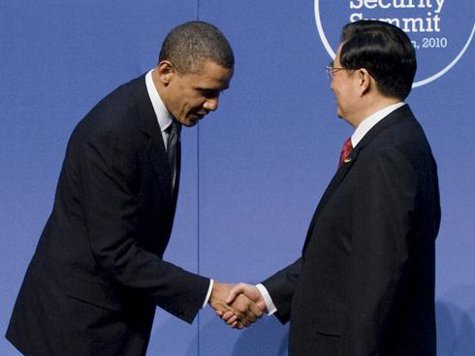
The populist movement sweeping the world is a direct threat to China as globalization’s biggest winner. A rebellious tone has swept the world with the Arab Spring, Socialist victories in France and Greece, Argentina nationalizing oil assets, Indonesia imposing a 50% tax on mineral exports, and the Occupy movement here in the U.S. All these events demonstrate rejection of globalization’s faith in supra-state institutions such as the European Union, the World Trade Organization, International Monetary Fund and the G8. This upheaval represents a new rise of nationalism and an enormous rejection of China as the world’s biggest exporter.
Early last week, China Daily reported the nation’s foreign-exchange reserves had actually dropped from February to March by $4.69 billion, “dragged down by short-term capital outflows.” The Chinese authorities publicly announced that the banking reserve ratio would be lowered to allow banks to expand lending by $63 billion. But the influential Stratfor Global Intelligence blog reported China’s four largest state-owned banks slashed lending by 99% in the first two weeks of May as bank deposits fell 16% in April and continued to fall in May. This may explain why Chinese buyers have been defaulting and deferring coal and iron ore deliveries.
Under the international rules of globalization, Chinese state-owned-enterprises (SOEs) are required to honor their purchase commitments, especially as prices fall. But back in August of 2009, China’s State-owned Assets Supervision and Administration Commission (SASAC) told the six foreign banks that provide over-the-counter commodity hedging services that SOEs reserved the right to unilaterally default on contracts.
An SASAC official was quoted “as saying that almost every SOE involved in foreign exchange or trade had some exposure to derivatives such as crude oil, non-ferrous metals, agricultural commodities, iron ore and coal, although only 31 SOEs were licensed to do so.” According to one European coal trader, after Chinese traders defaulted on at least six thermal coal cargoes they were being re-offered at a discount. He added: “That doesn’t even take into account the losses on freight rates. So rather than being bankrupted by these deals, they would rather dishonor the contract to survive.”
The IMF in 2000 identified four basic aspects of globalization: trade and transactions, private capital and investment movements, migration and dissemination of knowledge and technology. China’s communist leadership positioned the nation to win in this new era by welcoming unlimited amounts of foreign direct investments, but closing its capital account to prevent Chinese citizens from investing overseas. Consequently, two thirds of Chinese wealth ended up as deposits in state-owned banks at low interest rates. Chinese banks leveraged these deposits by a factor of 45 times to funding the growth state-owned-enterprises, regardless of profitability.
China’s industrial capacity has far outstripped China’s ability to consume the goods those plants produce, in order to maximize employment of impoverished Chinese peasants. When the Great Recession began in 2007, the Chinese were already spending an exorbitant 42% of GDP on capital investments. Instead of trying to rebalance the economy by encouraging domestic consumption, banks threw good money after bad to push the investment rate to 48% of GDP in 2010. Commodity prices vaulted as the rapid growth of manufacturing capacity made China the world’s biggest consumer of iron ore, coal and other base metals.
The huge monetary stimulus led to an over-heating of the economy, because productive investment opportunities were already non-existent. “Free money” fueled wide-spread inflation and powered a speculative real estate bubble. Chinese wages rose so dramatically that labor costs are now cheaper in Vietnam, Bangladesh and even Mexico consequently; Chinese exports are under heavy price pressure. Now with faltering global demand, financially overextended Chinese businesses are only surviving because bank loans have been refinanced and rolled-over.
The economic theory behind globalization argues that China should go through an extended period of austerity and let business bankruptcies create higher unemployment to drive down wage costs and allow Chinese companies to be more price-competitive. But according to Stratfor, “The Chinese government has made limiting unemployment a fundamental policy objective. Unemployment will lead to social instability and the Chinese Communist Party understands its consequences better than anyone. Unemployment was one of the engines that fueled their rise to power.”
The populist rebellion is a rejection of China’s globalization strategy which only benefits China. Beijing’s massive stimulus program over the last three years has only exacerbated the trade imbalance between China and the rest of the world. The imminent break-up of the European Union and the fading support for the World Trade Organization means nation-states will increasingly be retaliating against Chinese imports by building trade barriers. As exports shrink and unemployment rises, China’s stability will shatter.

COMMENTS
Please let us know if you're having issues with commenting.